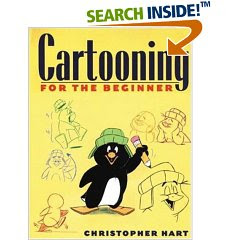It was impossible not to pick up an intro to cartooning book from the library after reading Making Comics. I did a quick Amazon search and found Cartooning for the Beginner and rented it from the library. The book appears to be catering to the 12 year old boy crowd, si I felt a tad bit like an adult checking out a Hardy Boys book, but I persevered the odds looks from the library and went through with the transaction.

I don't have a lot go on, but I have to say, I think the book worked out well. It's introductory chapters really did teach me a thing or two about cartooning, and drawing in general. My only complaint is that the learning curve is a bit steep - on one page you're learning to draw faces, and a few pages later, you're worrying about the expression of a whole body. But that's probably my lack of skill, more than anything else, showing through.
The book was good enough to give me a few key insights into drawing, and I'll share them below. For this, I have to give the book a 8.5/10 - it's probably not the ultimate guide to learning to draw, but it is fun and at least partially effective.
So, here's some insights I had...
Lessons Learned
- When drawing a face I'd start off with a circle for the head. This, as you could imagine, looked like a line crudely drawn circle. Then, I'd start adding in just as crude features - a mouth, nose, eye sockets, eyebrows, pupils and ears. At some point while doing this, the most amazing thing happened - these random shapes stopped being a bunch of squiggly lines and instead became a face. It's really an awesome side effect of the human brain, and I could actually feel an Ah! moment when this would happen. For this feeling alone, I'd suggest getting the book and learning to draw a face. It's too spooky.
-
I continue to be amazed at how efficient cartooning is for expressing information.
Consider this drawing from here:
 You can tell, just by looking at, that the kid is running. Yet, it's only a single frame. The fact that the brain plays this trick on you, and that cartoonists can so easily harness it, is awesome. The Cartooning For The Beginner covers this pretty well, too. Cartooning is truly the poetry of the visual world.
You can tell, just by looking at, that the kid is running. Yet, it's only a single frame. The fact that the brain plays this trick on you, and that cartoonists can so easily harness it, is awesome. The Cartooning For The Beginner covers this pretty well, too. Cartooning is truly the poetry of the visual world. -
I originally assumed that the minimal tools I'd need to get by would be a sheet of paper and a pencil. This was oh so very wrong. What I needed was paper, pencil, an eraser and a pen. Here's what I was doing wrong: I was trying to get the drawing perfect with a pencil. When, what I should have been doing was working with the pencil and eraser till I got things to the point where they were correct, and then traced it with pen.
Bottom line: drawing isn't about getting the picture 100% right the first time, it's about iterative development. And iterative development I can do.
I suppose this is obvious, in retrospect. However, I have to admin I always assumed that artists just Got It Right, and that's what I should be shooting for.
-
My biggest insight relates to this previous point. I'm starting to have a sense that one of the traits of a person who has mastered his craft is not that he never makes errors, but that he knows how to correct them quickly.
A professional programmer will always make syntax errors, yet, won't get stumped by them. The handyman who knows what he's doing, is just as comfortable with patching up a hole he accidentally put in the wall as he is avoiding the hole in the first place. And the artist with good technique knows how to use his tools (pencil and eraser) to not force himself into drawing only perfection - but instead, can refine his pictures till they are where he wants them to be.
To become better at drawing, I need to focus not on trying to be perfect but on learning how to fix errors.
Even if with the little progress I've made in learning to cartoon, I have to say, it's been rewarding. You should definitely give it a try.
Well, that sounds like fun. Unfortunately my drawings skills are so pathetic that my beginning circle would look bad (and would look worse each time I erased and tried again). :-) I guess I just don't have that hand/eye coordination for drawing. Sounds cool though!
ReplyDeleteThat's exactly how I felt when I started!
ReplyDeleteTurns out, there are some step-by-step things you can do, that even I couldn't mess up, which allow you to produce somewhat passable drawings.
It's definitely worth a try if you're interested...lack of natural ability shouldn't get in the way.